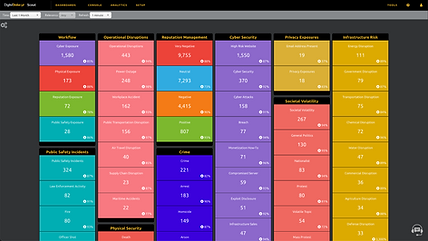
Geopolitical Risk Taxonomy for Geopolitical Intelligence
Overview of Geopolitical Intelligence
Geopolitical Intelligence involves the collection, analysis, and dissemination of information related to political, economic, and social dynamics between nations and regions. This discipline is crucial for understanding global power structures, predicting international conflicts, and navigating the complex landscape of international relations and global markets.
Components of Geopolitical Intelligence
Political Risk Analysis
This component focuses on assessing political stability, governance issues, and policy changes in various countries and regions.
Economic Intelligence
This aspect involves analyzing global economic trends, trade relations, and financial risks that can impact international business and diplomacy.
Conflict and Security Assessment
This component deals with identifying potential areas of international conflict, assessing security threats, and analyzing global defense dynamics.
Importance of Geopolitical Intelligence
Geopolitical Intelligence is vital because it:
1. Informs Strategic Decision-Making
Geopolitical intelligence helps in:
Shaping foreign policy and diplomatic strategies
Guiding international business expansion and investment decisions
Informing global security and defense planning
2. Enables Proactive Risk Mitigation
By providing insights into global trends and potential crises, it allows organizations to:
Anticipate and prepare for political and economic shifts
Develop contingency plans for various international scenarios
Adapt strategies to changing global landscapes
3. Enhances Global Competitiveness
Geopolitical intelligence contributes to competitiveness by:
Identifying emerging market opportunities
Assessing the impact of international regulations and trade agreements
Providing insights into global supply chain risks and opportunities
4. Supports Crisis Management
This intelligence is crucial for:
Navigating international crises and conflicts
Managing the impact of global events on operations and interests
Coordinating responses to transnational challenges
5. Fosters International Cooperation
By providing a shared understanding of global dynamics, this intelligence supports:
Building international alliances and partnerships
Facilitating multilateral negotiations and agreements
Promoting global stability and security
Sample Geopolitical Event Types/Descriptions
1. National
Events significantly impacting a single nation's political landscape, such as:
National elections and power transitions
Major policy shifts or reforms
Domestic political crises or upheavals
2. Civil
Internal conflicts or social movements within a country, including:
Civil wars or insurgencies
Large-scale protests or civil unrest
Significant demographic or social changes
3. State-Sponsored
Actions or policies directly attributed to national governments, such as:
Economic sanctions or trade embargoes
State-sponsored cyber attacks
Government-led nationalization of industries
4. International
Events involving multiple countries or having global implications, like:
International treaties or agreements
Global summits or conferences
Transnational conflicts or disputes
5. Diplomatic
Formal interactions between nations or international bodies, including:
Diplomatic negotiations or breakdowns
Establishment or severing of diplomatic relations
International mediation efforts
Sample Geopolitical Article Titles
"Breaking: Major Powers Sign Landmark Climate Accord, Global Markets React"
"Escalating Trade War Threatens Global Economic Stability"
"Coup d'État in Strategic Oil-Producing Nation Sparks International Crisis"
"Cyber Attack on Critical Infrastructure Raises Fears of State-Sponsored Warfare"
"Shifting Alliances in Asia-Pacific Region Reshape Global Power Dynamics"
Sample Courses of Geopolitical Action/Recommendations
1. Immediate Situation Assessment
Convene crisis management team to analyze the geopolitical event
Assess immediate impacts on global operations and interests
Identify key stakeholders and potential allies or adversaries
2. Strategic Intelligence Gathering
Intensify monitoring of affected regions and related global reactions
Engage local contacts and international networks for on-ground insights
Analyze potential scenarios and their implications
3. Diplomatic and Stakeholder Engagement
Initiate dialogue with relevant government officials and international bodies
Engage with industry peers to assess collective impact and potential responses
Communicate with key stakeholders to manage expectations and concerns
4. Risk Mitigation and Opportunity Identification
Develop and implement risk mitigation strategies for affected operations
Identify potential opportunities arising from the geopolitical shift
Adjust global strategies to align with new geopolitical realities
5. Long-term Strategic Planning
Reassess long-term global strategies in light of geopolitical changes
Develop scenario-based contingency plans for future geopolitical shifts
Invest in building resilience against potential geopolitical disruptions